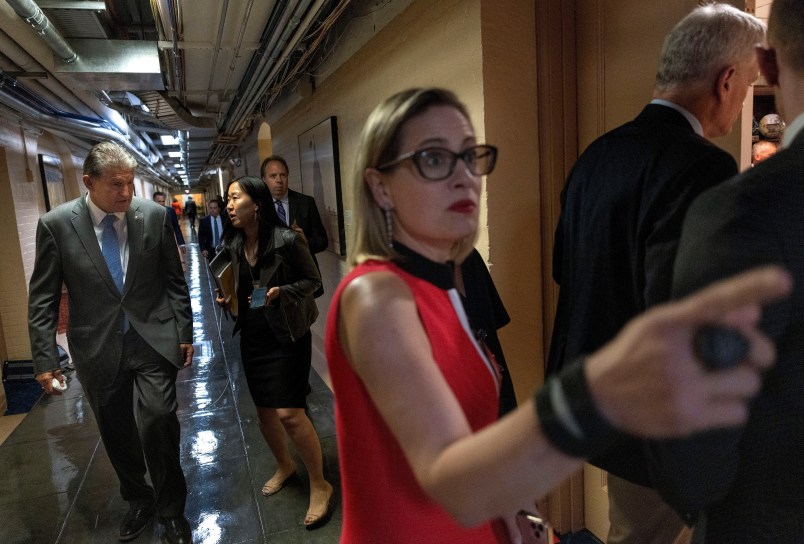In a word cloud of conversations about the filibuster, the biggest names would almost certainly be Sens. Joe Manchin (D-WV) and Kyrsten Sinema (D-AZ), the two outspoken Democratic defenders of the Senate rule who ensure its continued existence, to Republicans’ delight.
But the usual bemoaning of those two Democrats’ positions is almost always followed by a burst of common wisdom: that a group of other, quieter Democrats also want to maintain the filibuster, but are just hiding behind those two to avoid the heat and scrutiny.
An extensive dig into what Democrats have said and where they stand — which we put together in the TPM filibuster tracker — suggests a different reality.
Every single Democrat, except for Manchin and Sinema, is at least open to some form of filibuster reform. About half don’t want to scrap it outright — but many expressed an openness to reforms including lowering the 60-vote threshold, and requiring senators to talk, Mr. Smith Goes To Washington–style, if they want to filibuster a bill. Many have evolved on the issue, becoming less wedded to the rule in even just the past few years.
That’s especially true of older, institutionalist Democrats who are wary of blowing up the rule, but are increasingly convinced that it’s driving a stake through the heart of congressional productivity and, specifically, is proving an existential threat to President Joe Biden’s administration and current Democratic majorities.
Take Sen. Patrick Leahy (D-VT), for example. The current Senate president pro-tempore at age 81, Leahy is the definition of a Senate veteran, with almost 50 years in the chamber under his belt.
He voted to change the rule in 2013, faced with blanket Republican opposition to then-President Barack Obama’s nominees. But as recently as 2019, Leahy was completely dismissive of eliminating — “nuking” — the filibuster.
“No, I think that — I agree with Thomas Jefferson [who] said, you know, it’s the saucer where things cool,” Leahy said when asked if he’d get rid of the rule to help a Democratic president in 2020. “What I want to do though is see us come back to voting on things.”
Just two years later, he’s softened his stance.
“Senator Leahy opposes use of the filibuster as a tool for complete obstruction,” his spokesperson told TPM this month. “It is supposed to encourage bipartisan compromise, not entrench partisan warfare. If the filibuster continues to be used by Republicans to stop any and all critical legislation the American people desperately need, he believes it’s warranted to seriously consider reforming it.”
Or take someone like Sen. Bob Casey (D-PA): younger than Leahy at 61, but a fairly middle-ground Democrat from a battleground state. In 2017, he was one of the signatories on a letter asking Senate leaders to preserve the filibuster when Republicans were in the majority.
But by January of this year, he too had evolved on the issue.
“I’m certainly open to that in ways that I would not have said I was two years ago,” Casey told the Philadelphia Inquirer of a rule change. “The Senate doesn’t function like it used to and I think as much as I’d like to think that we can go back to those days when consensus and bipartisanship was the rule rather than the exception, now it’s the opposite.”
As the issue becomes a litmus test for Democrats running for office, those already in the Senate are increasingly opening their arms to the possibility of change.
A full 24 members of the caucus are either advocating for, or open to, eliminating the filibuster altogether, by TPM’s count. Another 24 are open to reforming how it works, whether that be a voting rights carveout or changing the requirements of the rule to put the onus back on the minority party to sustain the filibuster, rather than on the majority to defeat it.
That leaves only the infamous two standing in the way of changing the rule at all.
Politicians can be slippery, and it’s impossible to predict what the conditions will be when pressure on Democrats to change the rule grows to its boiling point. But at the very least, based on their own words, a shadowy cabal of Democrats secretly enamored with the filibuster is unlikely to shield the rule when and if that time comes. The true primary culprits are exactly who you think they are.







From the Article:
[“That leaves only the infamous two standing in the way of changing the rule at all (emphasis added).”]
This is problematic. There is too much reporting going in multiple directions (and quoting people like Al Franken and Norm Ornstein) to challenge the “at all” part of this statement.
And, for me, since we are in the negotiating stage (behind closed doors, etc.) all this may be rendered moot in the near future.
In any event, I do not see Manching going through the efforts to tinker (and not as bad as feared) with the S1 Bill all for the ultimate fate of it going down.
"“No, I think that — I agree with Thomas Jefferson [who] said, you know, it’s the saucer where things cool,” Leahy said…
Luv ya, Pat, but nobody drinks out of saucers anymore. I mean, how long do things have to cool off in the Senate…especially with McConnell’s way of “cooling” things off ?
That’s because Ben Nelson (Manchin) and Blanche Lincoln (Sinema) think that watering down what could be popular policy it will somehow endear them to either Republicans or democrats?
Fortunately, I live in Arizona and I can work to oust that performative bitch in 2024.
I’m not sure I buy it. For instance, did anyone speak to Sen. Feinstein? And when I say “speak to”, I mean the senator herself, not what her staff says.